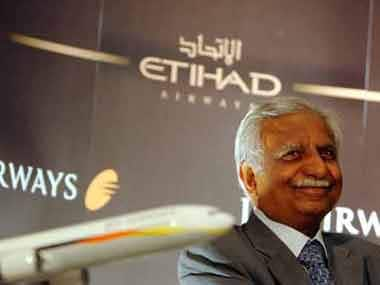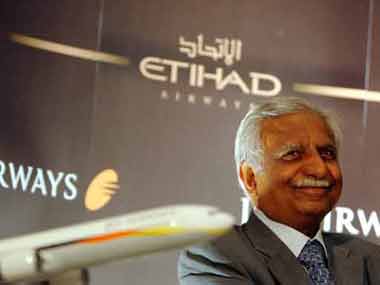First Vijay Mallya. Second, (possibly) Kalanithi Maran. And next, it could be Naresh Goyal. Indian civil aviation’s big private sector promoters are, one by one, looking to bow out of an industry that has only bled them dry. While Mallya’s Kingfisher is dead and gone, Maran’s
SpiceJet is in the ICU, seeking to induct a new partner
, preparatory to a possible exit. Will Goyal, Jet Airways boss, also be elbowed out of the business he pioneered in the private sector in the early 1990s? A report in The Economic Times today (14 January) wrongly stated that Goyal had pledged his entire shareholding of 51 percent with the Punjab National Bank (PNB). In a statement, Jet said Goyal had merely given PNB an undertaking that he would not dilute his equity below 51 percent through a sale. The statement noted that “it is thus an undertaking of non-disposal of any further equity and not a matter of pledging of his shares.” The confusion probably arose because of this
disclosure
made to the Bombay Stock Exchange. However, the fact that the shares have not been pledged means little when the value of the company’s debt is two times its current market value and nearly four times Goyal’s personal stake. At last count, the airline was valued at just over Rs 5,100 crore, while its debt was just under Rs 10,000 crore. Goyal’s 51 percent stake thus offers only a fig-leaf to cover the airline’s high exposure to debt. The undertaking to PNB is thus needed to give banks an additional layer of protection beyond the enterprise value of Jet Airways. In the year to March 2014, Jet had a negative net worth of Rs 2,227 crore. [caption id=“attachment_2045049” align=“alignleft” width=“380”]
 Naresh Goyal. Reuters[/caption] The probability, though, still points towards a Goyal exit at some point, or his reduction to a mere figurehead on Jet’s board – much like Mallya’s on United Spirits these days. If he exits, it is most likely to be in favour of Etihad, his 24 percent equity partner, which came in as white knight in 2013 when he was about to go under. Under current regulations, Etihad can buy upto 49 percent in Jet, but this can’t happen till Goyal cedes his share or issues fresh shares to Etihad. As things stand, only IndiGo seems to be fairly secure in terms of financial stability, with Go Air on the borderline and
Air India a taxpayer-funded stretcher case.
Even though the recent fall in jet fuel prices has provided major relief to all airlines, the competitive pressures have not reduced, thanks to the entry of AirAsia and the Tata-SIA Vistara in Indian skies. The private airline business kept its head above water in the 1990s largely by keeping competition out using its domestic lobbying power. But in the last decade, with the entry of low-cost carriers (LCCs) like SpiceJet, IndiGo and Go Air,
the business-cum-crony model that sustained them earlier went for a toss.
To meet the competition, Kingfisher and Jet expanded by acquisition and launched their own LCCs in the hope that they will fend off the low-fare competition. But, few airlines in the world have managed to combine a profitable full-service carrier (FSC) airline with an LCC. Usually, they have fallen between two stools. As the Indian aviation market trended fully towards LCCs and low fares, both Kingfisher and Jet found themselves bleeding. To make matters worse, they made a mess of their branding exercises. Kingfisher, for example, called its LCC Kingfisher Red. Jet, which had three brands, Jet (FSC), Jet Konnect and JetLite, compounded its branding problem by falling between three stools. Both Mallya and Goyal had made a fundamental error: you don’t call full-service and LCC services by the same name. They paid the price, as consumers saw no point in opting for the costlier airline service when the cheaper one with the same name was available. Goyal, who abandoned his LCC last August, admitted as much: “
We as an airline confused customers
(with multiple brands).” The real question is this: even assuming the new strategy works, can Goyal remain boss of Jet? It is unlikely that Etihad paid a huge premium (32 percent over market price) in 2013 just to buy a piece of the company.
While it got a huge increase in seats from India to Abu Dhabi
, it also bought a
majority stake in Jet’s customer loyalty programme
, Jet Privilege Private Ltd. Jet is also reorganising its services to serve as a feeder to Etihad’s hub in Abu Dhabi. Jet’s future is thus linked to Etihad, and it is anybody’s guess whether Goyal can continue to own a majority stake indefinitely. But one thing is clear: whether he remains at the helm or goes, his era is over. The airline business is not for people with very little capital and only crony power to sustain them. Goyal reigned in an era of crony power in civil aviation, and that era has, more or less, come to an end. The men have to take over from the boys.
Naresh Goyal. Reuters[/caption] The probability, though, still points towards a Goyal exit at some point, or his reduction to a mere figurehead on Jet’s board – much like Mallya’s on United Spirits these days. If he exits, it is most likely to be in favour of Etihad, his 24 percent equity partner, which came in as white knight in 2013 when he was about to go under. Under current regulations, Etihad can buy upto 49 percent in Jet, but this can’t happen till Goyal cedes his share or issues fresh shares to Etihad. As things stand, only IndiGo seems to be fairly secure in terms of financial stability, with Go Air on the borderline and
Air India a taxpayer-funded stretcher case.
Even though the recent fall in jet fuel prices has provided major relief to all airlines, the competitive pressures have not reduced, thanks to the entry of AirAsia and the Tata-SIA Vistara in Indian skies. The private airline business kept its head above water in the 1990s largely by keeping competition out using its domestic lobbying power. But in the last decade, with the entry of low-cost carriers (LCCs) like SpiceJet, IndiGo and Go Air,
the business-cum-crony model that sustained them earlier went for a toss.
To meet the competition, Kingfisher and Jet expanded by acquisition and launched their own LCCs in the hope that they will fend off the low-fare competition. But, few airlines in the world have managed to combine a profitable full-service carrier (FSC) airline with an LCC. Usually, they have fallen between two stools. As the Indian aviation market trended fully towards LCCs and low fares, both Kingfisher and Jet found themselves bleeding. To make matters worse, they made a mess of their branding exercises. Kingfisher, for example, called its LCC Kingfisher Red. Jet, which had three brands, Jet (FSC), Jet Konnect and JetLite, compounded its branding problem by falling between three stools. Both Mallya and Goyal had made a fundamental error: you don’t call full-service and LCC services by the same name. They paid the price, as consumers saw no point in opting for the costlier airline service when the cheaper one with the same name was available. Goyal, who abandoned his LCC last August, admitted as much: “
We as an airline confused customers
(with multiple brands).” The real question is this: even assuming the new strategy works, can Goyal remain boss of Jet? It is unlikely that Etihad paid a huge premium (32 percent over market price) in 2013 just to buy a piece of the company.
While it got a huge increase in seats from India to Abu Dhabi
, it also bought a
majority stake in Jet’s customer loyalty programme
, Jet Privilege Private Ltd. Jet is also reorganising its services to serve as a feeder to Etihad’s hub in Abu Dhabi. Jet’s future is thus linked to Etihad, and it is anybody’s guess whether Goyal can continue to own a majority stake indefinitely. But one thing is clear: whether he remains at the helm or goes, his era is over. The airline business is not for people with very little capital and only crony power to sustain them. Goyal reigned in an era of crony power in civil aviation, and that era has, more or less, come to an end. The men have to take over from the boys.
Jet Airways may be slipping out of Naresh Goyal's grasp. Here's why
R Jagannathan
• January 14, 2015, 18:01:53 IST
A newspaper wrongly reported that Naresh Goyal had pledged his entire stake in jet to Punjab National Bank. But his ownership of the airline is anyway steadily slipping from his grasp.
Advertisement
)